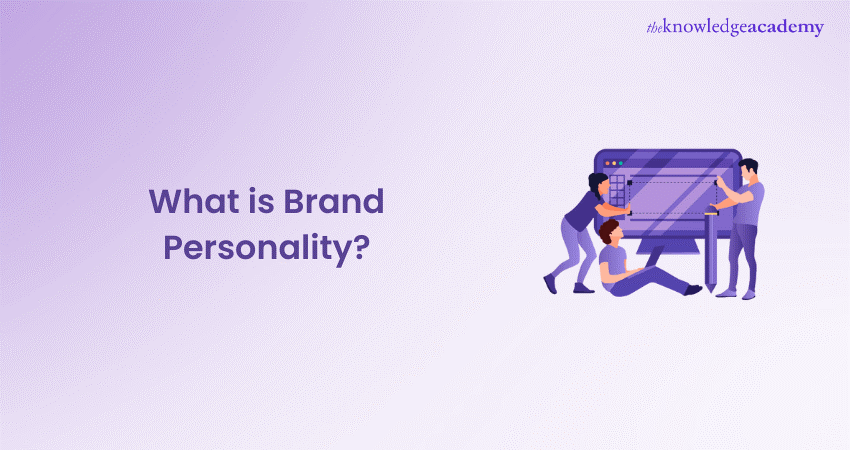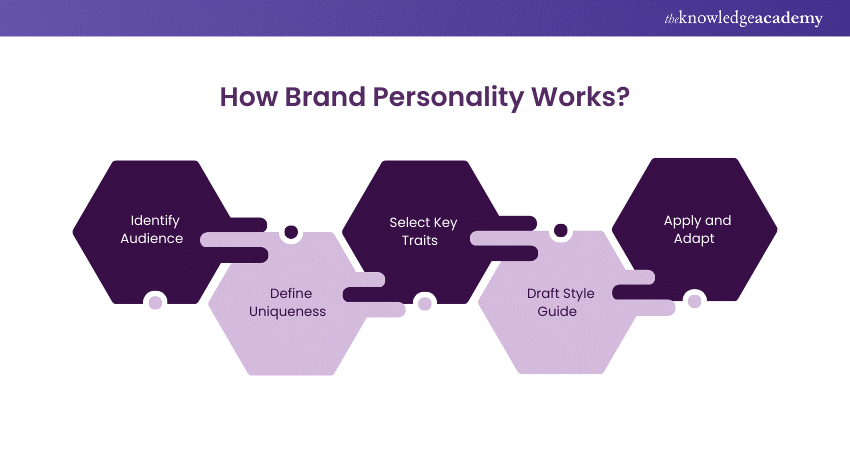We may not have the course you’re looking for. If you enquire or give us a call on +44 1344 203 999 and speak to our training experts, we may still be able to help with your training requirements.
Training Outcomes Within Your Budget!
We ensure quality, budget-alignment, and timely delivery by our expert instructors.

Picture this – you are walking into a shop and instantly feeling a connection with a brand. What makes you feel this way? This is the power of Brand Personality. But what exactly is this personality, and why does it matter? It is the set of human traits attributed to a brand, making it relatable and memorable to consumers.
Think about Apple’s innovative and sophisticated vibe or Nike’s dynamic and inspirational spirit. Wondering how can your brand achieve the same level of connection? In this blog, we’ll explore the concept of Brand Personality, its importance, and how you can develop a compelling personality too, let’s dive in!
Table of Contents
1) What is Brand Personality?
2) Importance of Brand Personality
3) How Brand Personality Works?
4) Examples of Brand Personality
5) Conclusion
What is Brand Personality?
Brand Personality is a distinct set of characteristics and traits that a brand communicates to its customers. Essentially, it’s the personality of a brand — that makes it relatable and memorable to its audience. When effectively conveyed, a strong Brand Personality can foster loyalty among your target market.
Just as individuals have personalities, brands can, too, help customers connect with and understand them on a deeper level. Brand Personality is expressed through your company’s tone of voice, core values, beliefs, and visual identity. It’s not just about the brand’s appearance or sound; it’s about the emotions and experiences customers have when interacting with your business.
Importance of Brand Personality
Brand Personality is a vital element of a successful brand strategy. It extends beyond logos and slogans, shaping how customers perceive and interact with your brand. Here are some key reasons why Brand Personality is important:
1) Differentiation
In a competitive marketplace, Brand Personality helps set your brand apart from others. It provides a unique identity that customers can recognise and connect with. This differentiation is crucial for standing out and capturing your target audience’s attention.
2) Emotional Connection
A well-defined Brand Personality creates an emotional bond with customers. By showcasing relatable characteristics, your brand can evoke feelings of trust, loyalty, and affection. This emotional connection encourages customers to choose your brand over others and fosters long-term loyalty.
3) Consistency
Brand Personality ensures uniformity in how your brand communicates and presents itself across all touchpoints. Whether through advertising, social media, or customer service, a consistent personality reinforces your brand’s identity and makes it more memorable.
4) Customer Loyalty
When your customers feel a personal connection to your brand, they are more likely to stay loyal. A strong Brand Personality can turn one-time buyers into repeat customers and even brand advocates who promote your brand to others. This loyalty is invaluable for sustained business growth.
5) Trust and Credibility
A clear and authentic Brand Personality builds trust and credibility. Customers are highly likely to trust a brand that consistently demonstrates its values and beliefs. This trust is crucial for building a positive reputation and encouraging repeat business.
6) Enhanced Customer Experience
Brand Personality enhances the overall customer experience by making interactions with your brand more engaging and enjoyable. Whether through a friendly tone of voice or a visually appealing design, a strong personality can make every touchpoint more impactful and memorable.
7) Guides Marketing Efforts
A well-defined Brand Personality provides a framework for all marketing efforts. It guides the creation of content, campaigns, and messaging that align with your brand’s identity. This alignment ensures that all marketing activities are cohesive and reinforce the brand’s personality.
8) Attracts the Right Audience
Brand Personality helps attract customers who resonate with your brand’s traits and values. By clearly expressing your personality, you can draw in an audience that shares similar beliefs and preferences, leading to more meaningful and lasting customer relationships.
Get a competitive edge by registering for our Digital Marketing Courses – sign up today!
How Brand Personality Works?
Developing a Brand Personality involves a series of strategic steps that help define and communicate your brand’s unique character. This process ensures that your brand resonates with your target audience and distinguishes itself in the marketplace. Here’s how to effectively develop and implement your Brand Personality:

1) Identify Audience
The first step in enhancing your Brand Personality is to find and understand your target audience. Identify who your customers are and what their preferences, values, and behaviours are. Conduct market research, create customer personas, and gather insights into what resonates with them.
Knowing your audience helps tailor your Brand Personality to connect with them on a deeper level, ensuring your brand speaks directly to their needs and desires.
2) Define Uniqueness
Your brand’s uniqueness sets it apart from competitors. Define what makes your brand special and why customers should choose you over others. This could be your mission, values, product quality, or customer service. Highlighting your Unique Selling Points (USPs) helps create a distinct Brand Personality that stands out in the market.
Ensure that these unique aspects are consistently communicated across all brand touchpoints.
3) Select Key Traits
Choose the key traits that best represent your brand’s personality. These traits should align with your brand’s values and resonate with your target audience. For example, your brand might be seen as innovative, trustworthy, playful, or sophisticated.
Selecting the right traits helps shape how your brand is perceived and ensures a consistent and relatable brand image. These traits should be reflected in your brand’s tone of voice, visual identity, and overall messaging.
Learn the strategies to enhance your online presence - sign up for our Social Media Marketing Course today!
4) Draft Style Guide
A style guide is essential for maintaining consistency in your brand’s personality. It outlines the key traits, tone of voice, visual elements, and messaging guidelines that define your brand.
The style guide helps as a reference for everyone in your organisation, ensuring that all communications align with your Brand Personality. It includes the following elements that contribute to a cohesive brand identity:
a) Details on language use
b) colour schemes
c) Typography
d) Imagery
5) Apply and Adapt
Once your Brand Personality is defined and documented, it’s time to apply it across all channels and touchpoints. Ensure that your website, social media, advertising, customer service, and other interactions consistently reflect your Brand Personality.
Continuously monitor and adjust your Brand Personality to stay relevant and connect with your audience. Regularly update your style guide to reflect new insights and market trends, ensuring your brand remains authentic and engaging.
Examples of Brand Personality
Understanding Brand Personality is crucial for creating a strong, relatable brand that resonates with your audience. By attributing human traits to your brand, you can foster deeper connections and loyalty among your customers. Let’s explore some well-known brands and see how their distinct personalities contribute to their success:

1) Dove
Dove’s Brand Personality is centred around care, authenticity, and empowerment. The brand promotes real beauty and self-esteem, often featuring real women instead of models in its campaigns. Dove’s messaging focuses on natural beauty and self-acceptance, aiming to make consumers feel confident and valued.
2) Nike
Nike embodies a dynamic, inspirational, and innovative personality. Known for its “Just Do It” slogan, Nike encourages people to push their limits and achieve greatness. The brand is associated with top athletes and cutting-edge sports technology, promoting a sense of determination, excellence, and athleticism.
3) Disney
Disney’s Brand Personality is magical, family-friendly, and imaginative. It aims to create a sense of wonder and joy, appealing to both children and adults. Disney’s storytelling and characters are designed to evoke nostalgia and happiness, making it a beloved brand across generations.
4) Apple
Apple’s Brand Personality is innovative, sophisticated, and user-centric. The brand is known for its sleek design, cutting-edge technology, and intuitive user experience. Apple positions itself as a leader in innovation, appealing to consumers who value creativity, simplicity, and premium quality.
5) Starbucks
Starbucks’ Brand Personality is welcoming, community-oriented, and innovative. The brand creates a “third place” between home and work where people can relax and connect. Starbucks is also known for its customisable drinks and seasonal offerings, reflecting a sense of creativity and personalisation.
Conclusion
In essence, Brand Personality breathes life into your brand, making it relatable and memorable to your audience. By defining and consistently expressing your brand’s unique traits, you can foster deeper connections and loyalty. Remember, this not only differentiates you from competitors but also turns customers into passionate advocates.
Discover how to harness your online presence to achieve tangible results – sign up for our Influencer Marketing Course today!
Frequently Asked Questions

The purpose of Brand Personality is to humanise a brand, making it relatable and memorable by embodying distinct traits. This fosters emotional connections, differentiates from competitors, and drives customer loyalty.

To develop Brand Personality, define a target audience, align with brand values, consistently reflect these traits across all touchpoints, and engage authentically.

The Knowledge Academy takes global learning to new heights, offering over 30,000 online courses across 490+ locations in 220 countries. This expansive reach ensures accessibility and convenience for learners worldwide.
Alongside our diverse Online Course Catalogue, encompassing 19 major categories, we go the extra mile by providing a plethora of free educational Online Resources like News updates, Blogs, videos, webinars, and interview questions. Tailoring learning experiences further, professionals can maximise value with customisable Course Bundles of TKA.

The Knowledge Academy’s Knowledge Pass, a prepaid voucher, adds another layer of flexibility, allowing course bookings over a 12-month period. Join us on a journey where education knows no bounds.

The Knowledge Academy offers various Digital Marketing Courses, including the Business Branding Course, Social Media Marketing Course, and Influencer Marketing Course. These courses cater to different skill levels, providing comprehensive insights into Campaign Optimisation.
Our Digital Marketing Blogs cover a range of topics related to Branding Strategy, offering valuable resources, best practices, and industry insights. Whether you are a beginner or looking to advance your Digital Marketing skills, The Knowledge Academy's diverse courses and informative blogs have got you covered.
Upcoming Digital Marketing Resources Batches & Dates
Date
 Business Branding Course
Business Branding Course
Fri 14th Feb 2025
Fri 11th Apr 2025
Fri 13th Jun 2025
Fri 15th Aug 2025
Fri 10th Oct 2025
Fri 12th Dec 2025







 Top Rated Course
Top Rated Course



 If you wish to make any changes to your course, please
If you wish to make any changes to your course, please


